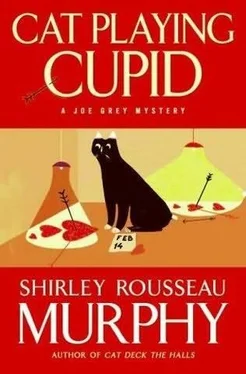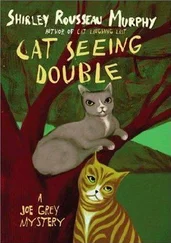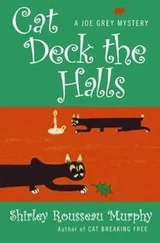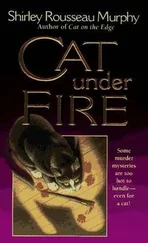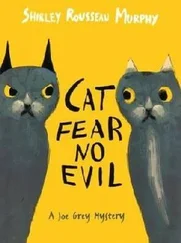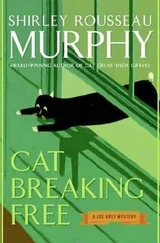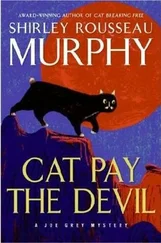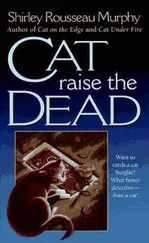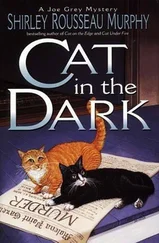But did the two have to watch him? Did they have to laugh? Didn't it occur to them to give a cat a little privacy?
Joe didn't emerge from the Styrofoam carton until he'd licked the plastic clean, until he was replete and purring with enchilada, chile relleno, and beans. Outside the back door, Rock was still pawing and yipping impatiently. Mike had sensibly left him there until Joe finished his supper-Rock's digestive system, unlike Joe's, couldn't handle such rich treats. Joe remained on the counter washing his paws and whiskers as Mike let Rock in, gave him some kibble, then fixed cappuccinos for himself and Lindsey. When the couple retired to the living room, where Mike lit a fire, Joe sauntered in past Rock, who had stretched out on the rug, and leaped into his own clawed and fur-covered easy chair, where he curled up pretending to doze as the couple settled cozily on the couch. Mike was saying, "You and Ryder have always been at such odds? Even when you were children?"
"We never got along, it was always war."
"That had to be stressful. Is that why you never told me much about your childhood?"
"It's painful to talk about, painful for me to go back to that time. Even when we were little, Ryder always demanded to be boss. She'd pitch a fit to get her way, and it was easier to let her have it."
She sipped her cappuccino, her hazel eyes sad. "She'd get me into trouble for something she did, and Mama never believed me. I guess that's a common enough scenario, the world over. But even so, it hurts."
"And you didn't fight back, didn't stand up for yourself?"
She shrugged. "Ryder was two years older, and she was the beautiful one, she was Mama's girl. Our father died in a highway accident when I was five, he was a trucker. After he died, I had no one to stand up for me, no one who really cared. I was the throwaway child.
"Later, the few men Mama dated, none of them made friends with me. It's strange-they were all weak men, nothing like my dad. Almost as if Mama didn't want them to compete with him? I never knew the answer.
"But then George came along," she said, the sadness leaving her face. "She started dating George Afton. They were married when I was twelve. He was older than she, a coach at a private academy in Sacramento, and we moved there. It was a coeducational academy, but boys and girls had separate classes. Ryder didn't like that, she didn't like any of the rules. She didn't like wearing a uniform, didn't like being separated from the boys. I liked it all-the rules made me feel safe, as if someone cared about me."
Tears glistened in her eyes. "George was the first person who ever stood up for me after Dad died." She found a tissue in her pocket, was silent a moment, shook her head with embarrassment. "He defended me against Ryder and against Mama. He made Ryder back off, and he showed me how to stand up for myself." Joe could see this wasn't easy for her. "He taught me how to get back at Ryder, to give as good as I got. He showed me how to do that quietly if I could, or," she said, grinning, "sometimes, not so quietly."
She sipped her drink, leaning comfortably against Mike when he put his arm around her. "When George entered our lives, Ryder started treating me with some respect. It didn't make her like me more, but it got her off my back."
She gave him a wry smile. "She's never forgiven George for that change in me. She's never forgiven me.
"George tried to help Ryder, too, tried to get her interested in something that would deserve all her abundant energy. But it never happened. All she cared about were boys, clothes, movie magazines-she had a terrible hunger for surface pleasures, a voracious hunger for glitz and glamour."
Lindsey looked down again at her hands, as if only they were neutral, offering a calm focus. "It's a waste. Ryder's beautiful, but what's come of it? She's not happy, far from it. And I'm not happy when I'm around her. I wish she hadn't come back here, I wish she'd stayed in L.A. "
"She came because of Ray Gibbs?"
Lindsey nodded.
"And your opinion of Gibbs?"
"Oh, that he's…an opportunist." She looked at Mike intently, then burst out laughing. "The guy's a sleaze. What else could you call him?"
Mike laughed, and touched her cheek. "That wasn't a pleasant childhood. After your father died, you were lucky to have a second chance, lucky that George came along."
She looked grateful for his understanding. "George's friendship meant everything to me, he showed me the strength to grow up without losing myself. Without going off the deep end and getting into trouble."
Mike looked at her for a long moment. She had tears glistening again, and she leaned into him. "It's silly to be so emotional," she said, "after so many years. I just…I guess I'm easily undone, just now."
He kissed her and held her. Embarrassed, Joe Grey dropped off the chair and padded silently out of the room, heading upstairs to his tower, to the cool, empty, impersonal winds of the roof. Private was private, he was not a voyeur.
But even so, he spent the next week listening to Mike's side of their increasingly romantic phone calls, watching Mike dress to take Lindsey out, or watching the two of them cook dinner together in Clyde's comfortable family kitchen, laughing and easy with each other. Who knew a romance could progress-or be rekindled-so quickly?
But they had been very close once. And he had to wonder if this reawakened romance was indeed mutual. Or if Lindsey, despite what seemed to be her genuine and honest caring for Mike, despite her quiet charm and the touching account of her childhood, was only putting Mike on, winning him over again after their long separation-winning the law to her side.
No one could be sure, yet, that Lindsey Wolf wasn't simply a very good actor. No one could be certain that she hadn't killed Chappell.
The most obvious scenario was that she'd found out he'd taken another woman with him to Oregon, had followed them in a rage and shot him. Or shot them both.
If so, where was the woman's body? Or had she not been shot, but escaped, seen the shooting and run?
And where did Lindsey dispose of the gun? He thought she wasn't bold and arrogant enough to have kept a murder weapon that could easily lead back to her.
Had she buried it in that Oregon forest, thinking it would never be discovered? And then, ten years later when she read that the body had been found, she'd panicked? Afraid of what the cops might find, had she, with practiced innocence, contacted Detective Garza wanting to learn what the department knew or guessed? Wanting to know if Oregon had any evidence pointing to her? Wanting to know if she should run, but at the same time hoping to charm and distract the law? But that would be foolish, and would take more brassy nerve than Joe saw in Lindsey. If, indeed, he was seeing her clearly.
And what if Lindsey hadn't killed Chappell, but had received that letter? What if she'd suspected Chappell was in danger but hadn't gone to the law, if she'd simply let the murder happen? If so, then wasn't she as guilty as the killer, when that letter, in the hands of law enforcement, might have saved Chappell's life?
One minute the tomcat had the gut feeling that Lindsey, despite her gentle charm, was lying, that she'd known for ten years that Chappell was dead. And the next minute he wanted badly to trust her and thought it more likely that Ryder had forged the letter, that maybe Ryder, or Ray Gibbs, had killed Chappell.
And, sprawled among the cushions in his rooftop tower, Joe thought the quickest way to find out was to move in with Ray and Ryder. Play lost kitty. Move in as a homeless stray, get cozy with them, listen to their conversations, toss their condo, see what he could learn.
Right. Get cozy with Ray Gibbs and Ryder Wolf. Play up to Gibbs, and Gibbs snatches him up and rings his little cat neck, or tries to. And for all he knew, Ryder could be just as vicious.
Читать дальше
